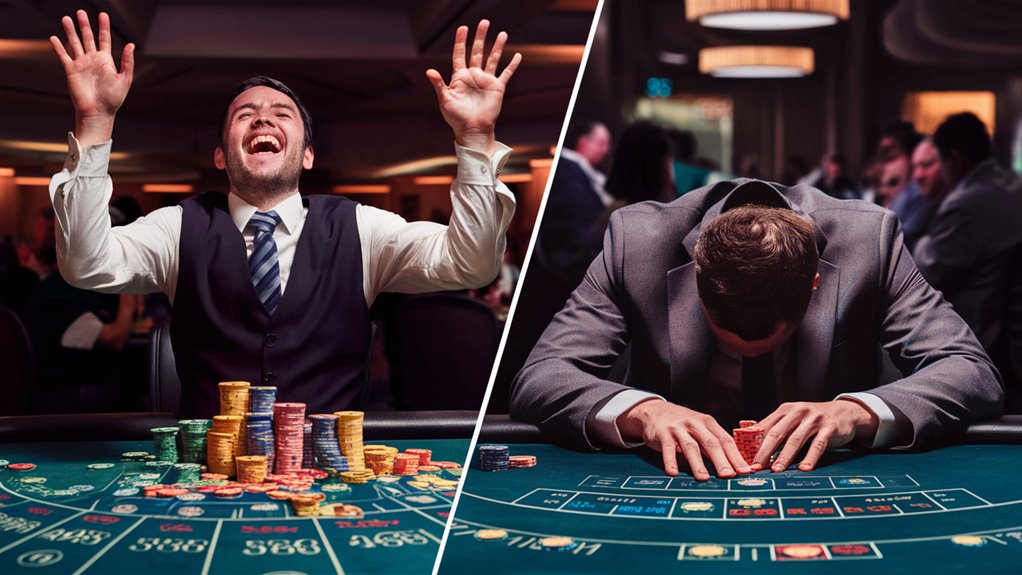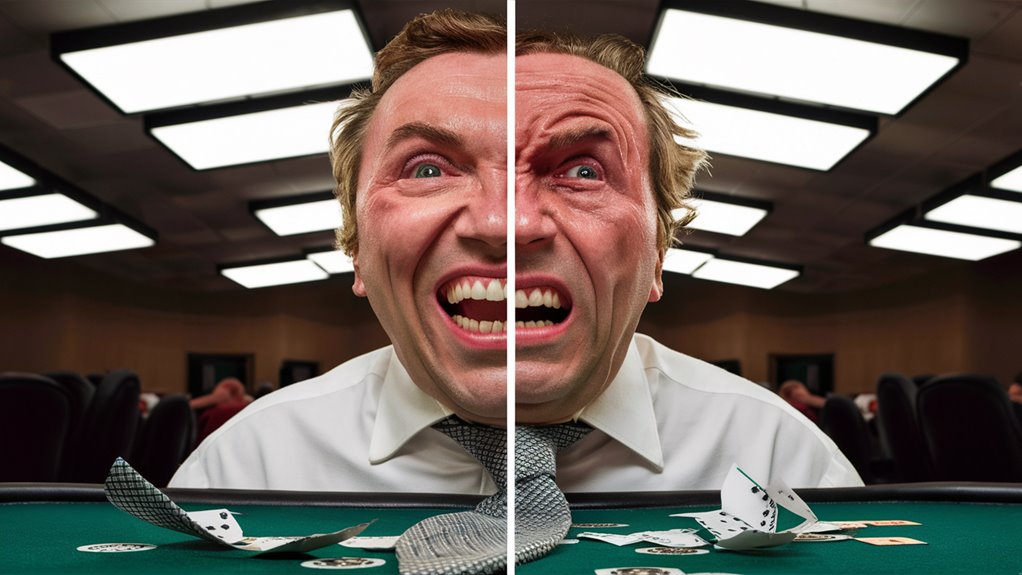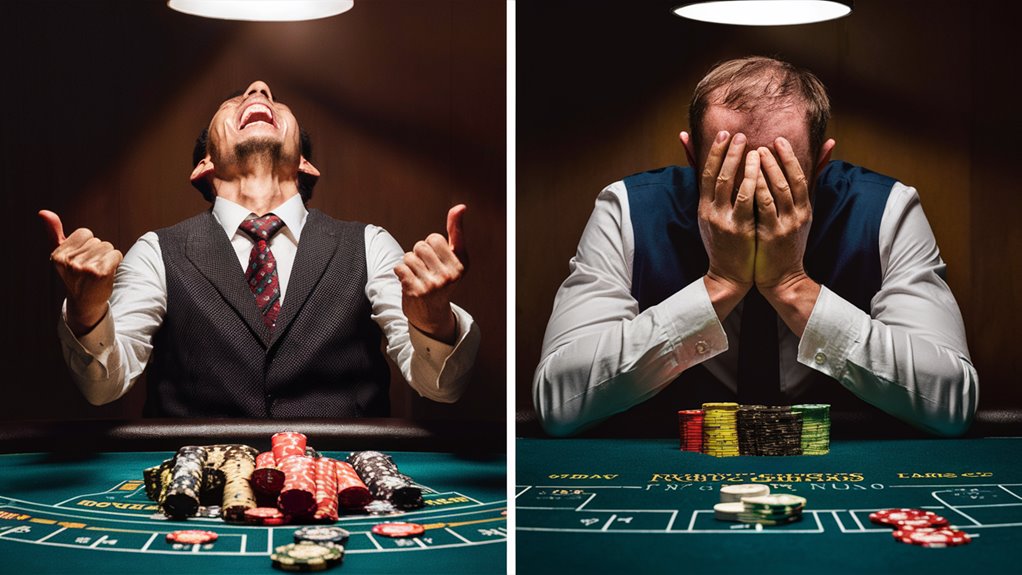
How Gamblers Respond to Wins Vs Losses: A Simple Look

The Mind of Gamblers
How gamblers react has deep effects on mind and body that change how they make choices. Studies show that the brain’s joy center works differently when they win or lose.
What Happens When They Win
When gamblers win, they feel a strong rush of dopamine which makes them very happy. This reaction makes them:
- Take more risks by 37% 온카스터디 인증리스트 추천
- Think they are better than they are
- Feel more rewards coming
- Too sure of their gambling skills
What Happens When They Lose
Losses in gambling bring on stress which changes how they think:
- Stress chemicals block clear thought
- Start harmful chasing of losses
- Make even riskier bets
- Twists how they see chances
The Cycle of Wins and Losses
The different ways they react to wins and losses create a feedback loop affecting:
- How they remember
- How they will choose later
- How they see risk
- How they handle feelings
Knowing these patterns helps us see why gambling hooks people and affects their thought paths. This info is key to spot and help those with gambling problems.
The Mind Behind Gambling
Brain Rewards and Gambling
Too much gambling stirs the brain’s joy spots, much like drugs do, starting dopamine rushes during wins and waiting periods.
This brain activity builds a strong cycle, with almost-wins lighting up joy paths almost like real wins do.
The brain acts under gambling like it does under drug issues, a big worry for mind health helpers.
Chasing Losses and Twisted Thinking
Bad gambling habits often grow worse after losses, starting a cycle known as chasing losses.
The brain shows a habit, liking possible wins too much and seeing losses as too small.
Selective memory in gamblers shows in brighter memories of wins and less thoughts of losses, pushing bad gambling cycles.
Random Rewards and Behavior Ties
The not knowing rule is key in gambling minds, mainly through changing reward plans.
This unsure nature gives the strongest behavior link, showing why slot games and sports bets are so drawing.
In gambling moments, the brain’s boss-like thinking dips as feeling-based choices take over, setting up the best spot for addicted acts to start.
Key Mind Points:
- Dopamine works during wins and almost-wins
- Joy paths get excited
- Twisted thinking in choices
- Changing rewards tie
- Feelings lead over clear thought
When Luck Joins In
When Luck Joins: Get the Mind of Winning At Games
The Rush of Big Wins
When gamblers hit it big, their brains let out a big wave of dopamine, making a strong “winner’s high”.
This happy chemical state can last for hours, changing how they decide things.
The brain’s effect from a win ups the thrill levels and can block wise thinking, making them bet more.
The Skill Idea
Winning at games often makes players think they control or know more than they do.
Winners think their win comes from top playing ways or special know-how, even when luck rules the game.
This mind trick starts a risky loop of gambling more due to wrong ideas of skill.
The Money of the House Idea
A core mind reaction known as the house money idea starts when gamblers see their wins as game cash, not their own.
This mind money trick changes how they view risk, as they see gains as casino cash, not theirs.
This mind split often ends in more daring bets, often wiping out early wins through even riskier bets.
Handling Big Losses
Handling Big Gambling Losses: A Full Guide

Seeing the Impact of Big Losses
Great gambling losses wake strong mind and body reactions that hit the gambler hard.
Studies show these losses start high stress chemicals like cortisol and adrenaline, seen in faster heartbeats, more sweat, and deep worry.
The body responses often join deep feelings of shame, deep sadness, and feeling lost.
The Bad Cycle of Chasing Losses
Chasing losses is a very risky pattern in too much gambling.
During times of big losses, thinking gets very clouded by upset feelings, leading players to make even riskier bets.
This starts a bad feedback loop where wise thinking falls apart, changed by quick, need-based betting.
Good Recovery Moves
Do Now Steps
- Stop all gambling right now
- Call pro gambling help
- Talk it out with people who care
Pro Help Ways
- Crisis lines for gambling issues
- Pro therapists and counselors
- Money advisers who know gambling recovery
Long Heal
Studies keep showing that gamblers who start help early do better and cut down big risks of money and feeling crash. Pro support groups give key tools and plans for lasting recovery from gambling-related losses.
Memory Bends in Gambling
Memory Bends in Gambling: Know Mind Twists
The Mind of Selective Memory in Gambling
Studies show gamblers show clear mind bends when they think back on their bets, making twisted views that keep up their gambling acts.
Players mostly remember their win times better while making less of their losses, a mind event known as selective memory bend. This mind twist keeps hopes not real about gambling results.
Stats Show Memory Bends
Wide studies show gamblers think their wins come more often and bigger than true by 30-40%. This memory bend is seen in more talk of win times while not much talk of losing times, keeping mind bends alive.
Brain studies through scans show stronger joy spots during wins than pain centers during losses, adding to this memory lean.
Touch on Problem Gambling Acts
The selective memory thing grows a lot in problem gamblers, who show big trouble in tracking their true money flow.
These people stick to good gambling times while seeing losing times as just small problems. This selective remembering helps explain non-stop betting despite growing losses, as twisted memories paint a too-good view of gambling results.
Key Memory Twist Points:
- Better win remembering
- Making less of losses
- Joy centers get going
- Money tracking problems
- Mind making it look better than it is
Risk Checks After Big Wins
Get Risk Checks After Big Gambling Wins
The House Money Idea and Risk Acts
Gambling minds show that players bet way riskier right after a big win.
This event, known as the “house money effect,” really changes how they see risk, making them see wins as money to throw, different from their own cash.
This mind break often leads to more bold betting and less care for losses.
Mind Impact on Making Choices
Dopamine waves after big wins lead to a joy state that really touches clear thinking.
This mind reaction makes gamblers show two key behavior changes:
- Thinking they will win more than likely
- Not seeing how big losses can be
Players often up their bet sizes and take part in high-risk bets they would usually skip.
Risk Checks in Different Gambling Levels
How they see risk after wins touches all levels of gamblers, both new and old hands.
Studies show a straight link between the first big win size and later risk-taking acts.
This starts a likely risky cycle where gamblers go for more and more risky bet plans, often ending in:
- Losing what they first won
- Building up big losses
- Growing betting acts
The mind impact of big wins can start a wave of more and more risky choices, really changing usual risk checks and betting ways.
Breaking The Wheel
Breaking The Wheel: Get Over Gambling Risk Growing
Know Risk-Taking Acts
Forced gambling and growing risk-taking after wins start bad cycles needing smart steps to stop.
Studies show that changes in post-win acts are key to break the wheel of addicted gambling habits.
Proven Fixes
Before Betting Plans
Set hard cash limits before starting any gambling. Studies show that these before betting plans cut quick betting acts by 37%. Key steps include:
- Leave credit cards behind
- Fix how much to spend
- Only use cash
- Set time limits
Fixing Mindset Tricks
Fix wrong gambling thoughts through mind fixing:
- Break myths about “hot runs”
- Write down gambling acts
- Keep track of wins and losses
- Spot what makes you bet
Pro Help Ways
Mind Help Moves
Mind Behavior Help (CBT) shows a 60% fix rate for gambling issues. Key mind help parts include:
- Regular talk help times
- Act change training
- Handling triggers
- Growing coping acts
Tech Fixes
Use tech blocks to make barriers:
- Self-stop plans
- Blocking gambling tech
- Money move limits
- Time managing tools Why Some Players Prefer Low-Stakes Games
Help Groups
Join getting better groups through:
- Group help from others
- Online talk rooms
- Family talk help
- Who answers to who links
Breaking free calls for a full plan mixing act changes, pro lead, and real blocks.
Winning depends on non-stop use of these proven plans while keeping strong help groups.


